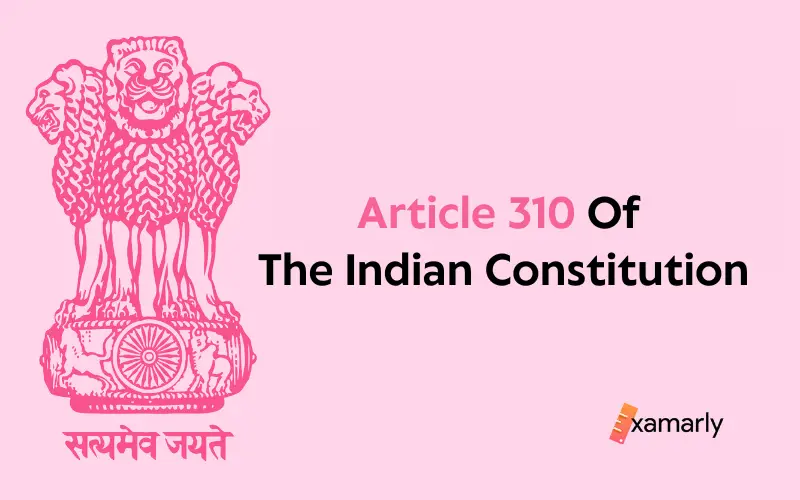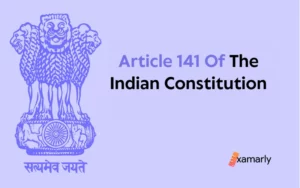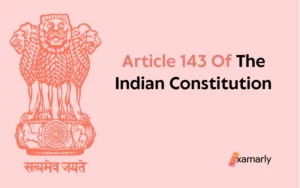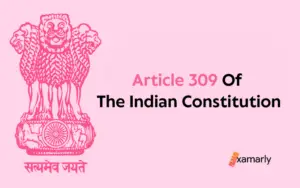Article 310 of the Indian Constitution deals with the doctrine of pleasure, which applies to the appointment and dismissal of certain government servants.
Let us dig deep into Article 310 of the Indian Constitution and get to know everything about it.
What Is the Doctrine Of Pleasure In the Indian Constitution
The doctrine of pleasure is a principle of the Indian Constitution that gives the President and Governors the power to appoint and dismiss certain public officials at their discretion. This doctrine is derived from the British system of constitutional monarchy, where the sovereign had the power to appoint and dismiss public officials at their pleasure.
In the Indian Constitution, the President and Governors are empowered to appoint and dismiss the following public officials at their discretion:
- Judges of the Supreme Court and High Courts
- The Attorney General of India and the Solicitor General of India
- The Comptroller and Auditor General of India
- The Chairperson and Members of the Union Public Service Commission
- The Chairperson and Members of the State Public Service Commission (in the case of the Governor of a state)
The doctrine of pleasure is based on the premise that these public officials hold their office at the pleasure of the President or Governor, and can be removed from office at any time by the President or Governor, as the case may be. However, the President and Governors are required to act on the advice of the Council of Ministers (in the case of the President) or the Chief Minister and Council of Ministers (in the case of the Governor) while exercising their powers under the doctrine of pleasure.
Article 310 Of The Indian Constitution – In Detail
Let us break down each and every clause of Article 310 of the Indian Constitution to have an in-depth understanding of the clauses.
Clause 1 – As It Is & Explained
(1) Except as expressly provided by this Constitution, every person who is a member of a defence service or of a civil service of the Union or of an all India service or holds any post connected with defence or any civil post under the Union, holds office during the pleasure of the President, and every person who is a member of a civil service of a State or holds any civil post under a State holds office during the pleasure of the Governor of the State
The first clause of Article 310 of the Indian Constitution says that except provided by the constitution of India exclusively, every single person who is serving either in defence or in civil services of either Central or State Government amid pleasure of the President.
It also says that every single person who is serving either in defence or in civil services of either Central or State Government amid pleasure of the Governor of the State.
You Might Also Like To Read – Article 307 Of The Indian Constitution
Clause 2 – As It Is & Explained
(2) Notwithstanding that a person holding a civil post under the Union or a State holds office during the pleasure of the President or, as the case may be, of the Governor of the State, any contract under which a person, not being a member of a defence service or of an all India service or of a civil service of the Union or a State, is appointed under this Constitution to hold such a post may, if the President or the Governor as the case may be, deems it necessary in order to secure the services of a person having special qualifications, provide for the payment to him of compensation, if before the expiration of an agreed period, that post is abolished or he is, for reasons not connected with any misconduct on his part, required to vacate that post
According to the second clause of Article 310 of the Indian Constitution, even though a person holding a civil post under the Union or a state serves at the pleasure of the President or Governor, respectively, a contract for their appointment may provide for the payment of compensation if the post is abolished or the person is required to vacate it before the expiration of an agreed period if the President or Governor deems it necessary to secure the services of a person with special qualifications. This compensation will only be paid if the person is not required to vacate the post for reasons related to misconduct on their part.
Summing Up
Most government servants who are members of the defence service, civil service of the Union (central government), or all India service, or hold certain posts related to defence or under the Union, serve at the pleasure of the President. Compensation will only be paid if the person is not required to vacate the post for misconduct on their part.
FAQs On Article 310 Of The Indian Constitution
Here are some frequently asked questions about Article 310 of the Indian Constitution:
What does Article 310 of the Indian Constitution cover?
Article 310 of the Indian Constitution covers the terms and conditions of service of persons holding civil posts in the Union and states. It states that the terms and conditions of service of persons appointed to civil posts in the Union and states shall be regulated by law made by Parliament or the state legislature, as the case may be.
What are the provisions of Article 310 of the Indian Constitution?
Some of the key provisions of Article 310 of the Indian Constitution are:
It guarantees the right to hold a civil post in the Union or a state to any citizen of India, subject to the provisions of the Constitution and any law made by Parliament or the state legislature.
It states that the terms and conditions of service of persons appointed to civil posts in the Union or a state shall be regulated by law made by Parliament or the state legislature, as the case may be.
It provides that the terms and conditions of service of persons holding civil posts in the Union or a state shall not be varied to their disadvantage after their appointment.
What is the significance of Article 310 of the Indian Constitution?
Article 310 of the Indian Constitution is significant because it sets out the terms and conditions of service of persons holding civil posts in the Union and states. It guarantees the right to hold a civil post to any citizen of India, subject to the provisions of the Constitution and any law made by Parliament or the state legislature. It also ensures that the terms and conditions of service of persons holding civil posts are not varied to their disadvantage after their appointment.






